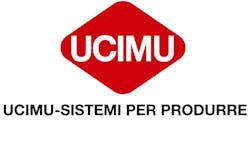Italian Machine Tool Sales Rose 3.5% in 2012
Italy’s manufacturing technology producers made it through 2012 with an overall positive result, but the trade association that represents them registered concern that the manufacturing sector recovery that followed the 2009 global financial crisis has lost its momentum. UCIMU-Sistemi per Produrre, representing Italy’s machine tool, robot and automation system manufacturing industry, released preliminary output data showing its members’ orders totaled €4.93 billion (est. $6.55 billion), an increase of 3.5% over the 2011 total.
The results demonstrated the importance of exports to the Italian machine manufacturers, who have seen domestic orders decline considerably as the European debt crisis depressed Italian (and regional) demand. UCIMU members increased their export volumes by 12% over 2011, totaling €3.65 billion ($4.85 billion) in the preliminary data.
The decline of the Italian domestic market became critical during 2012, with sharp declines in domestic activity during the second quarter and third quarter.
“The positive results of Italian manufacturers are due to a good performance in the foreign markets,” explained UCIMU president Luigi Galdabini. “Exports, both to emerging and traditional markets, have in fact enabled the companies to close the year at the same levels of 2011.”
The leading export markets for Italian machine tool builders are (in order of volume) China, the U.S., Germany, Russia, and France. Exports increased to China (+9.5% to €299 million), the U.S. (+42.5% to €264 million), Russia (+31.3% to €131 million), and France (+9.9% to €128.7 million); but shipments to Germany declined 1.4% during 2012, even though it remained the third-largest export market at €259 million.
Other significant export markets for Italian machine tool builders are Turkey, India, Poland, and Mexico.
Domestic 'dismantling'
As for the Italian domestic market, consumption of manufacturing technology products totaled €2,220 million during 2012, a year-on-year decline of 13%. “The weakness of the demand has had a strong impact on the deliveries to manufacturers, which decreased by 14.8%, down to €1,280 million, and on imports, which decreased by 10.4%, and only reaching a total value of €940 million,” according to UCIMU.
The decline appears to be almost entirely related to the weakness of the Italian economy: the trade association noted that the import-to-consumption ratio among its members’ sales grew only slightly, from 41.1% in 2011 to 42.3% in 2012; the export-to-production ratio rose from 68.5% in 2011 to 74% in 2012. “Although the two indicators are not directly linked,” UCIMU noted, “they underline the capability of the manufacturers in both guarding the domestic market, and in strongly intensifying their activities on the export front.”
The group is forecasting further slowing in domestic demand for machine tools, robots, and automation systems, but nevertheless expects its production total to increase by 1.2%, to a €4,990 million. It predicts that the sector’s exports will grow by 2.1%, to €3.725 billion, but domestic consumption will fall 1.6% to €2.185 billion, affecting both domestic deliveries and imports.
“The industry of the sector have in this way recovered much of the ground lost with the 2009 crisis,” Luigi Galdabini noted, “but the situation is really much more complex due to a structural reduction in the domestic market.
“The stalling in demand for machine tools in Italy is today a problem, not only for Italian manufacturers, but first and foremost for the country as a whole, which by dismantling its strategic sectors – from the chemical sector, to the capital goods sector, to the steel sector – one by one, runs the risk of being demoted to a level B economy."
Reiterating a point he raised several times during 2012, Galdabini called for economic policies to encourage new investments in Italy’s domestic manufacturing sector, including investment tax credits and more lenient lending terms for new equipment investments. He also encourage trade laws that encourage domestic consumption or achieve reciprocity with favored trading partners.
Galdabini also called for policies that will encourage equipment buyers to expand and increase employment, including tax reductions to lower hiring and employment costs.
“If exports are indeed currently supporting the whole sector,” he said, “it is necessary that measures are put in place, for the promotion of such an expensive activity, which is strongly dependant on the degree and the type of technological innovation applied to the product based on its intended market.”
